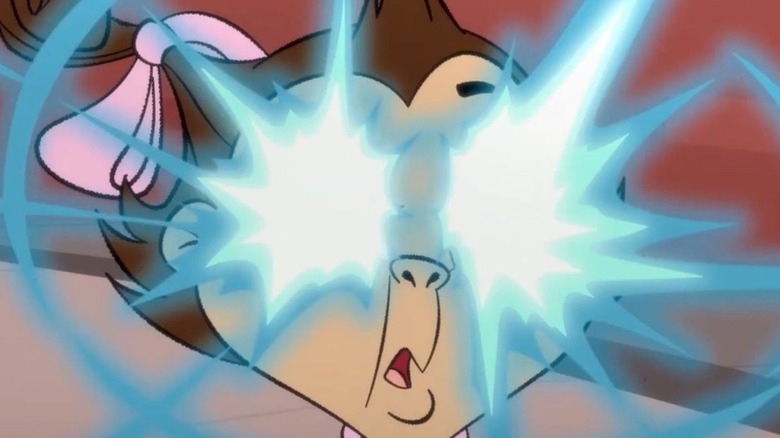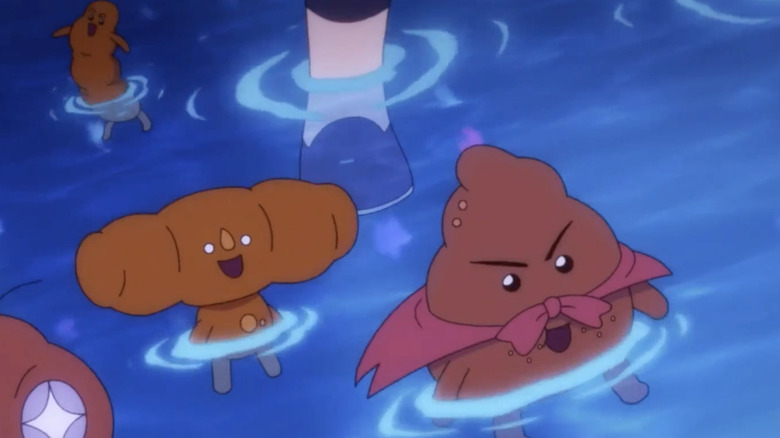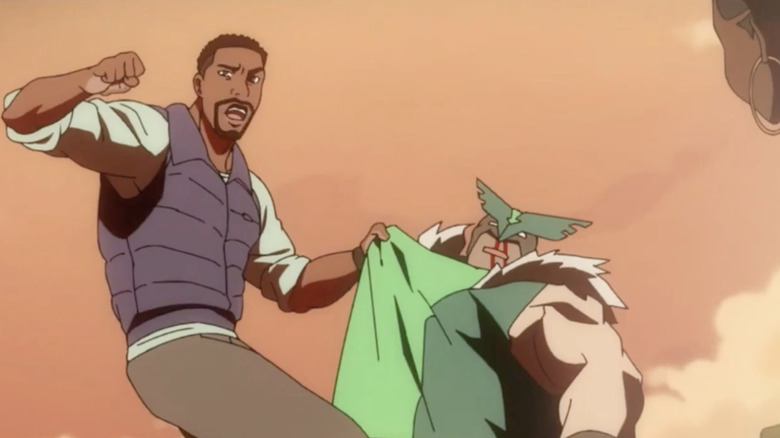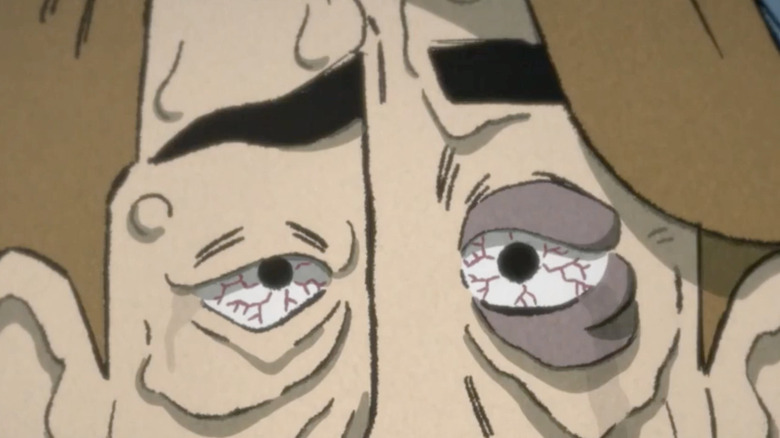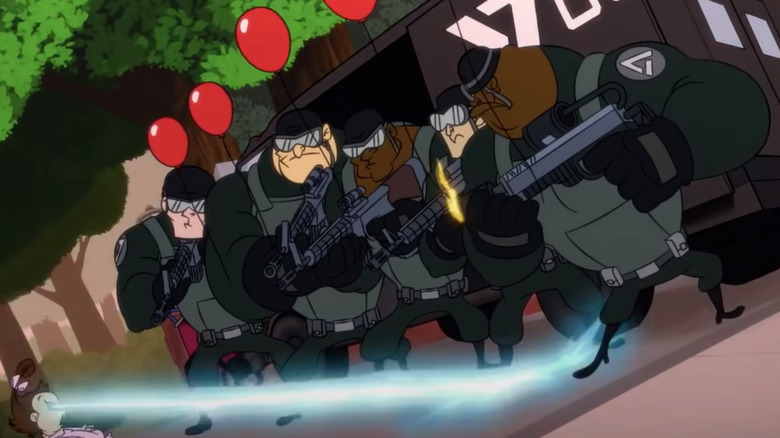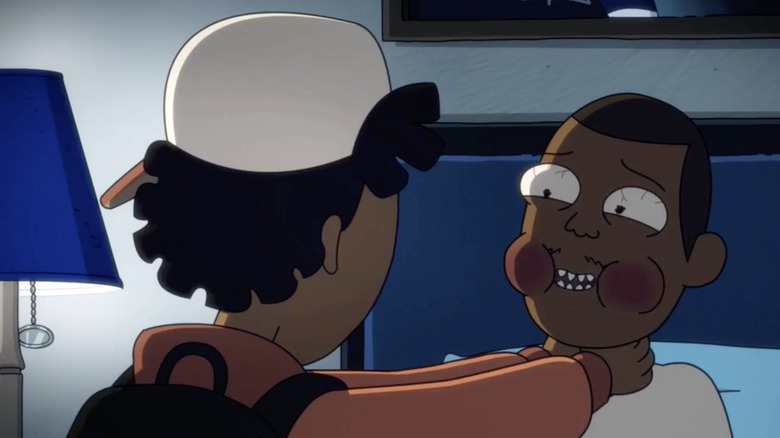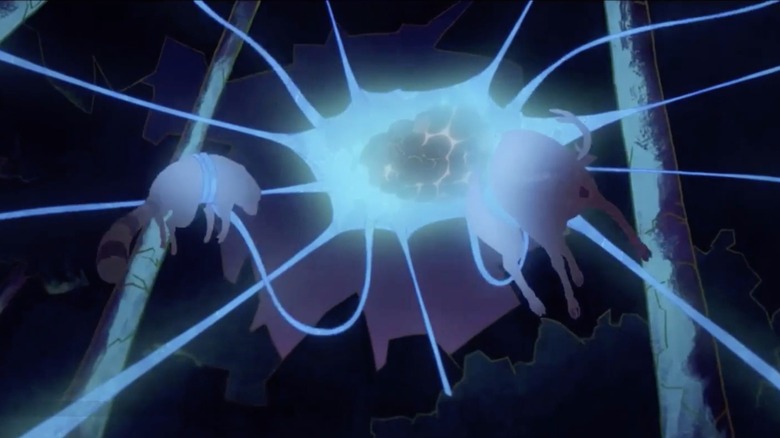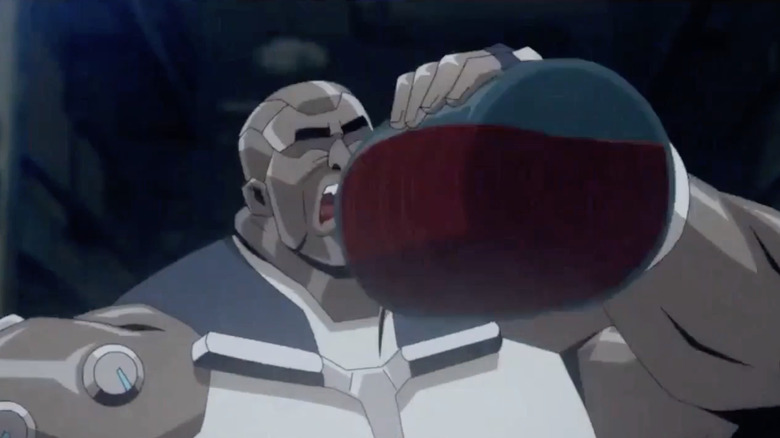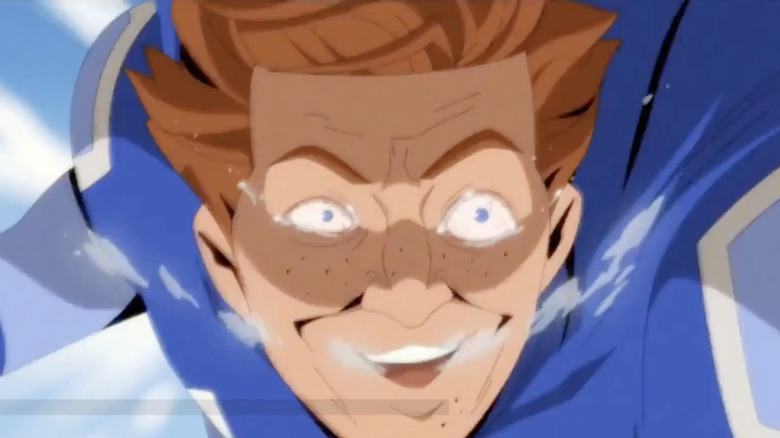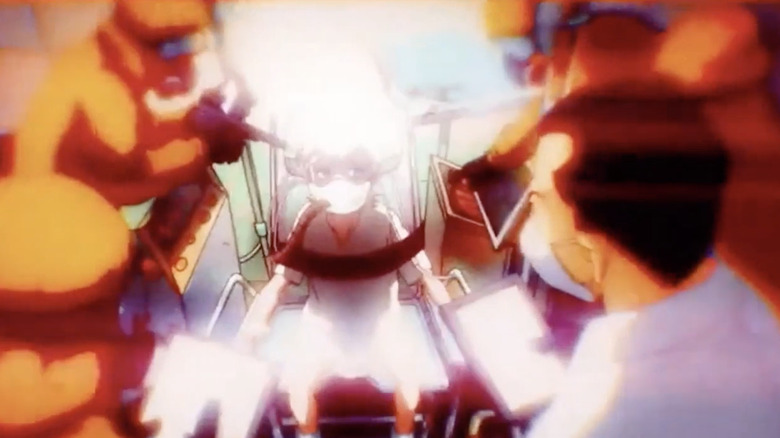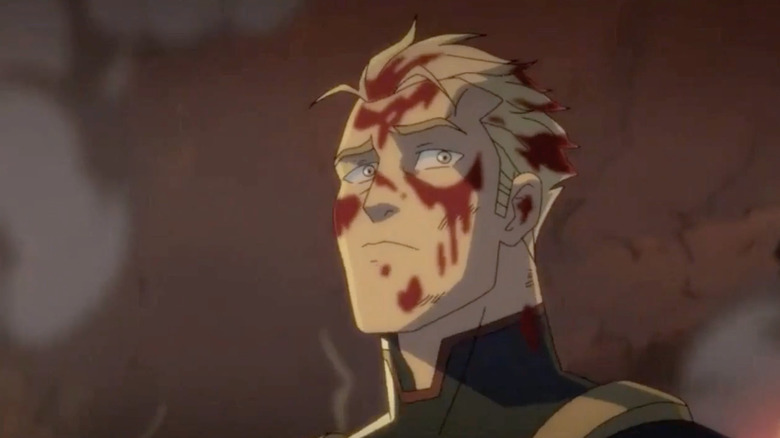The Most Disturbing Moments From The Boys Presents: Diabolical
"The Boys," Garth Ennis and Darick Robertson's brutal deconstruction of the superhero genre, is one of the most infamously disturbing comic book series of all time. The live-action television adaptation — developed by "Supernatural" creator Eric Kripke and streaming on Amazon Prime Video — restrains some of the excesses of its source material, but it's still one of the most violent and twisted shows around. Between the 2nd and 3rd seasons of "The Boys," Amazon also released an animated anthology spinoff titled "The Boys Presents: Diabolical."
The eight 12-minute cartoon shorts included in "The Boys Presents: Diabolical" offer fresh looks at the show's universe from different writers and directors using a variety of animation styles. As one would expect from this franchise, these episodes all have their fair share of violence, grossness, and perversion. In some cases, cartoony art and comedy make this content less disturbing than the live-action show. In other cases, the animated portrayals end up being even more upsetting. Here are the 10 most disturbing parts of "The Boys Presents: Diabolical," roughly ranked from least to most extreme.
Warning: All entries contain SPOILERS.
Power over poop
"BFFs," the fifth episode of "The Boys Presents: Diabolical," is easily the lightest of the eight shorts. Written by Awkwafina and directed by Madeleine Flores, this kawaii anime-inspired episode is about an awkward teenager who ends up with some Compound V after being peer pressured into getting drugs for some mean girls. After taking the superhero-creating drug, she makes a new friend and discovers new powers.
The catch: Her new friend is a literal turd, and her power turns out to be the ability to control poop — which, as it turns out, is still a more practical and useful ability than The Deep's power to control fish. The turds she creates and befriends are all cutesy characters somewhere between the poop emoji and Sanrio designs, which somewhat blunts the gross factor. Compared to the others, this episode doesn't haven't much in the way of graphic violence either, with only one bloody death scene. Even so, the concept alone is pretty gross.
A false accusation turns deadly
"The Boys Presents: Diabolical" Episode 6, "Nubian vs. Nubian," has less graphic on-screen violence than other episodes, but the psychological scars of the violence are clearly felt. Written by Aisha Tyler and directed by Matthew Bordanave, this story centers around the relationship between Nubia and Nubian Prince, this universe's equivalents of Storm and Black Panther. Forced into marriage by Vought, the two only ever got along when fighting side by side, and in their domestic life, they mostly just fight with each other.
Their daughter attempts to save their marriage by convincing their old nemesis, Groundhawk, to engage in another battle. Groundhawk is reluctant but goes along with the girl, who threatens to frame him as a pedophile. This threat of false accusation backfires badly when she tries to explain the situation to her parents. As soon her parents hear the word "pedo," however, they beat Groundhawk to death, traumatizing the girl as she watches the killing.
One mind-blowing twist ending
For 11 minutes of its 12-minute run time, "Boyd in 3D" seems uncharacteristically sweet for "The Boys Presents: Diabolical." The show's fourth episode, written by Eliot and Ilana Glazer and directed by Naz Ghodrati-Azadi, follows a man who tests an experimental drug that lets him transform into his ideal physical appearance. The short's satirical look at body image issues, the perils of social media fame, and furries fit with the dark, crude, and intelligent humor that defines "The Boys." However, the story avoids much in the way of violence and appears to be building to a happy ending where the main characters learn lessons and find true love.
But there's still one minute left after that too-cute Hollywood ending, and the episode ends on a figuratively and literally mind-blowing twist — it turns out that everything we've seen since Boyd started the drug trial has been a fantasy. The product being tested is actually melting both his face and his mind, and as Vought scientists declare the trial a failure, Boyd's head suddenly explodes in a gigantic burst of blood.
Looney Tunes with extra gore
Those who saw the first teaser for "The Boys Presents: Diabolical" know what to expect from the show's first episode, "Laser-Baby's Day Out." This "Vought-Toon" — written by Seth Rogen and Evan Goldberg and directed by Crystal Chesney-Thompson and Derek Lee Thompson — is what happens when you mix the style and structure of a classic "Looney Tunes" short with the gore and superpowers of "The Boys."
This wacky misadventure centers around a beleaguered scientist who tests the powers of the babies Vought experiments on. Babies who can't control their powers are sentenced to death, but the scientist desperately wants to protect one such tyke with laser vision from such a horrible fate. The dialogue-free slapstick that ensues brings to mind Chuck Jones' classic "Feed the Kitty" and the Mindy and Buttons segments from "Animaniacs," but with way more exploding organs.
Killing parents with pathetic powers
Fans of "Rick and Morty" and "Solar Opposites" will be able to tell instantly from that the second episode of "The Boys Presents: Diabolical" was the brainchild of Justin Roiland. Roiland co-wrote it with Ben Bayouth, and "Mao Mao: Heroes of Pure Heart" creator Parker Simmons directed it. The episode's mouthful of a title, "An Animated Short Where Pissed Off Supes Kill Their Parents," sums up the plot, and the execution plays a lot like an "Interdimensional Cable" segment from "Rick and Morty."
Why are the supes in this episode killing their parents? Mainly, they feel betrayed after finding out that their parents willfully gave them powers that turned out extremely pathetic. These powers — which range from doing everything in slow-motion to constantly burning genitalia to being a giant tongue — get put to use in a series of comically gruesome killings straight out of a "Rick and Morty" action sequence. One of these not-so-impressive supes, who is cursed with breasts on his face, has extra motivation for matricide: a particularly upsetting flashback shows how his mother turned the intestines of dead puppies into needlework.
The horrifying cancer monster
"John and Sunhee," the seventh episode of "The Boys Presents: Diabolical," is its most unusually poetic and mournful. The title card doesn't drop until the end of the episode, and when it does, you might find yourself surprised that such a serious tearjerker was written by comedian Andy Samberg. "Voltron: Legendary Defender" director Steve In Chang Ahn handles this story with an anime-inspired flare, paying homage to the most frightening moments from "Princess Mononoke."
Instead of a decapitated forest god killing everything in its path, the monster at the center of "John & Sunhee" is cancer. At first, it's operating how cancer usually operates, slowly killing the elderly woman Sunhee. John thinks he's saving his wife's life by giving her some Compound V, and sure enough, she's up and stronger than ever after being given the superhero drug — but so is her cancer. It leaves her body and gains superpowers of its own, gruesomely absorbing the bodies of people and animals. Ultimately, the only way to stop this horror is for Sunhee to sacrifice herself. The voice acting by Oscar winner Youn Yuh-Jung really sells the tragedy.
The most offensive super-drug
Given how grotesque the original "The Boys" comics got, it's no surprise that an animated episode written by creator Garth Ennis proves to be one of the most disturbing. "I'm Your Pusher," directed by Giancarlo Volpe of "Avatar: The Last Airbender" fame, is the third episode of "The Boys Presents: Diabolical," and it's so gleefully offensive that even those who've become accustomed to the live-action series' boundary-pushing content might find it a bit much.
This episode involves Billy Butcher interrogating a drug dealer who does business with The Seven. Iron Cast, a member of The Seven newly introduced here, turns out to have a particularly sick drug of choice: he drinks the blood of dying children as a source of sexual gratification. It's disgusting enough in and of itself, but there's an additional level of provocation in writing a villain so close to what QAnon conspiracy theorists believe their supposed enemies are doing.
A gut-busting double homicide
Butcher's big plan in "I'm Your Pusher" involves taking down two supes for the cost of one. The episode's other newly introduced supe, The Great White Wonder, regularly takes heroin enemas, but Butcher forcefully convinces the supe drug dealer to spike his supply with another concoction. As a result, when The Great White Wonder is being inducted into the Superhero Hall of Fame, he's so high that he can barely control his powers.
At the induction, Homelander asks him to fly through a flaming ring held up by Iron Cast. Instead, The Great White Wonder flies around the city at such great speed that he ends up missing the ring entirely and instead hits Iron Cast in the stomach. The resulting collision kills both of them, with The Great White Wonder's arm cracks to pieces as his body hurtles through Iron Cast's massive torso. The animation renders the deaths and their aftermath in startlingly graphic detail.
Homelander's childhood flashbacks
Homelander might be one of the most irredeemable characters in "The Boys," but his backstory of childhood abuse at the hands of the Vought corporation nonetheless lends this loathsome figure some degree of sympathy. The final episode of "The Boys Presents: Diabolical" only heightens Homelander's tragically sympathetic side. "One Plus One Equals Two" — from "Invincible" writer Simon Racioppa and the directing duo of Giancarlo Volpe and Jae Kim — centers on a younger, more human Homelander at the start of his superhero work.
The short begins with the Vought press conference that first introduces the supe then known as "The Homelander" to the world. Homelander is initially anxious about answering people's questions, but after freezing up for a bit, he is able to recite his false prewritten backstory. The lies of his speech are intercut with the dark truth, showing flashbacks of child Homelander being experimented on, burned, drowned, and beaten up.
Homelander's first massacre
Those flashbacks are only an appetizer to the true horror in "One Plus One Equals Two." Homelander's first mission, working alongside Black Noir, is to try to free the people being held hostage at a chemical plant. Homelander initially approaches this mission with a surprising commitment to nonviolence, using his powers to break and take away the hostage takers' guns. When one man still threatens to use the broken gun, Homelander decides to burn it up with his heat vision — which causes the gun to explode, accidentally killing one of the hostages.
From there, everything goes wrong. The traumatized Homelander can't control his own strength. He accidentally rips off a woman's jaw, enters a blind rage of massacring both hostages and hostage-takers alike, and is tricked by Black Noir into blowing up the entire plant. The single non-supe survivor of the explosion gets her head twisted by Black Noir, who has prepared an entire cover-up to make the deaths look like an accident and sell both Homelander and himself as heroes. At the start of the episode, Homelander seems like someone with the potential to do good, but by the time the episode ends, viewers fully understand how he became the twisted, evil, and, well, diabolical character that fans of "The Boys" love to hate.
